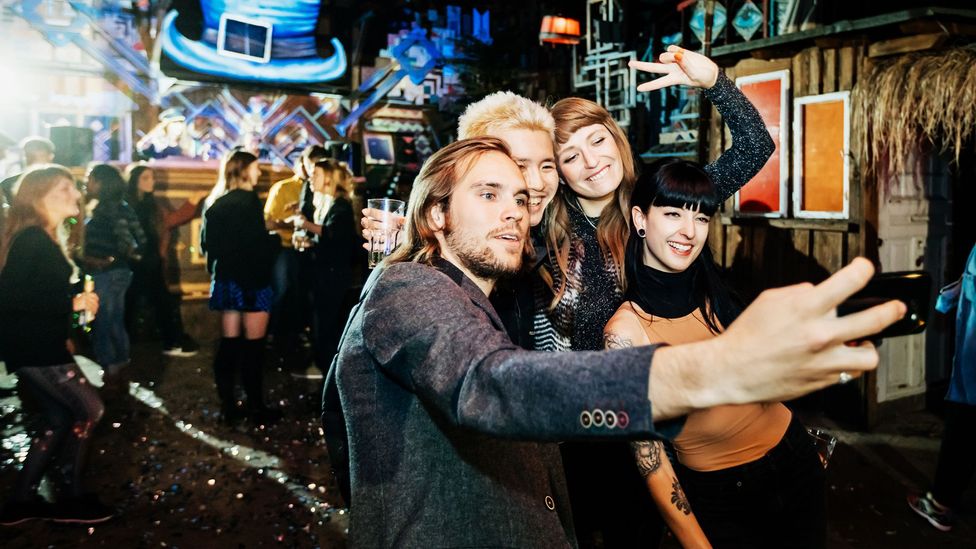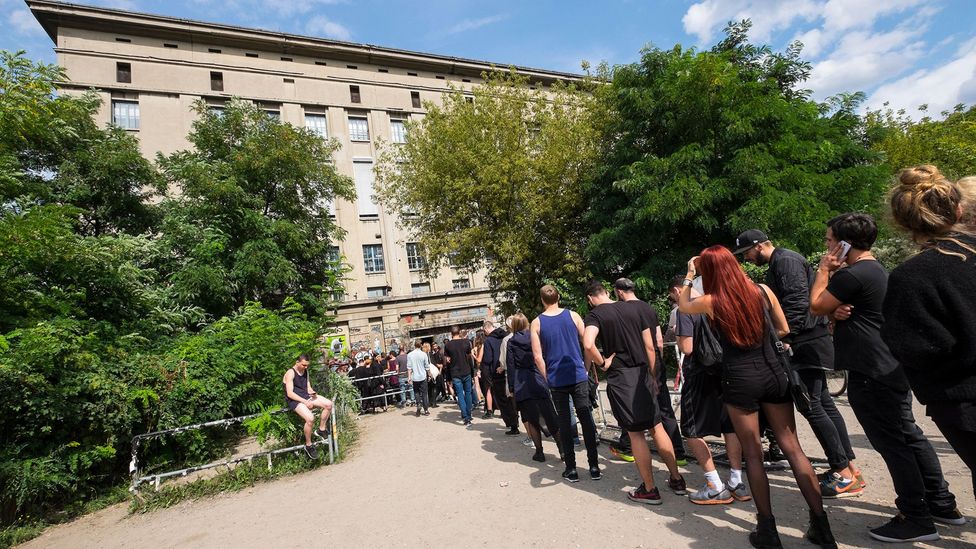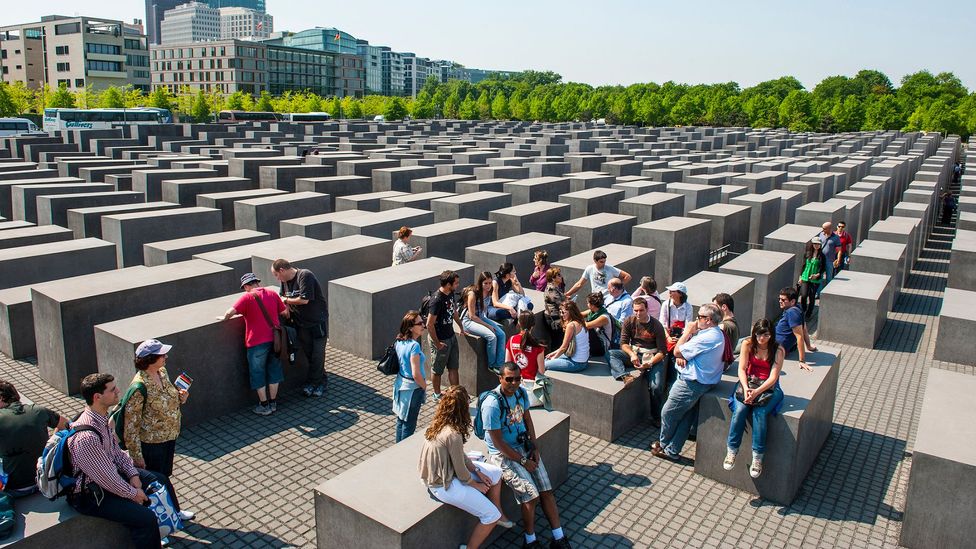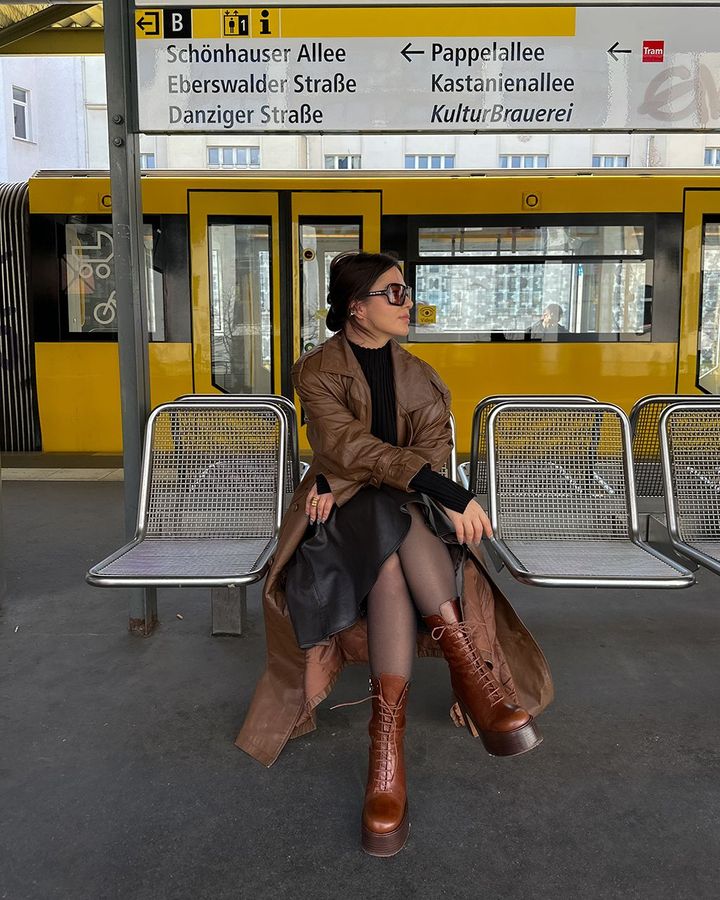The European city where selfies are ‘awkward’
In addition, while there isn't an outright ban, Berlin is home to highly solemn post-war spaces – such as the Memorial to the Murdered Jews of Europe in Mitte – where photography is seen as highly inappropriate, if not forbidden.

Want to take a selfie? In Berlin, where privacy, living in the moment and counterculture are highly valued, the answer may be “no”.
It was 01:00, raining and just 2C, but Café Luzia was buzzing. The bar in Berlin’s trendy Kreuzberg neighbourhood was alive with pre-club revellers wrapped up in big coats talking loudly in front of the graffitied mirrors and surreptitiously lighting cigarettes on open candles.
“Let’s get a selfie!” said a girl at our corner table, extending her arm to capture the group. She was from Paris, on her first trip to the German capital. We laughed and complied, edging together for the shot. As our group settled back, a friend – who has lived here on and off for years – said, “It’s quite funny; here in Berlin, it’s not really done to take selfies.”
This wasn’t the first time I’d heard this since coming to Berlin six months ago. Here, I’ve noticed distinctly fewer people posing with their phone cameras in public, with selfies seen as self-indulgent. In my hometown of Sydney, with its world-famous harbour and countless alluring beaches, selfies for social media feel like a fun addition to the everyday. In Berlin, it seemed much rarer.
It’s not news that Germans more widely value their privacy to a high degree. According to 2017 research from the University of Hohenheim on attitudes, behaviours and perceptions of privacy, German citizens disclose personal information “quite rarely”. And when it comes to sharing photos of themselves on social networks, such as a selfie on Instagram, the researchers found that “only a few Germans” found it “useful” to do so. “The highest percentage [was] found among the youngest participants (7%),” the report noted.
“Germany is one of those countries where privacy concerns are noticeably more pronounced,” said Philipp Masur, co-author of the 2017 report and assistant professor at Vrije Universiteit Amsterdam, where he studies digital communication and the impact of social media on our daily lives. “In [the former] East Germany, [pronounced state surveillance] may have led people to be slightly more concerned about issues related to privacy.”

Until the Berlin Wall fell in 1989, Berlin was split between the German Democratic Republic (GDR) in the East and the Federal Republic of Germany (FRG) in the West. As such, Berlin residents, as well as other residents of the GDR, were subject to extensive surveillance by the Ministry for State Security – also known as the Stasi.
But while this history could go some way in explaining a contemporary concern over online privacy from state actors or even a lingering anti-capitalist distrust of large companies – and what they might be doing with data uploaded to their platforms – there may be more to this avoidance of taking selfies in public in Berlin.
Many Berlin residents I spoke to believe that their “no-selfie” culture developed via its famous club scene – whose hallowed venues seek to maintain an air of secrecy online and encourage partiers to revel in the moment. I’d been surprised when I first arrived in the city to see signs with a slashed cross through a camera at almost all the clubs I visited. But I’ve now got used to the fact that I cannot take photos inside and must either put my smartphone away or place a sticker over its lens.
That’s because not only are Berlin’s clubs home to some of the world’s best techno music, but they are also considered an outlier in terms of what they provide for their patrons: a place where people are liberated to act in a way that is not always accepted in public. No more is this more obvious than in the nightclubs that market themselves as safe spaces, specifically created for the enjoyment of counterculture movements including the LGBTQI+ community, the kink scene and sex-positive groups.

Berghain (widely seen to have championed the no-photo rule when it brought it in, circa 2006), about blank and Sisyphos, remain the best-known clubs with an aversion to photography in Berlin. Another standout example is KitKat, a famously sex-positive club in Mitte. Here, guests are encouraged to wear fetish, patent and leather, glamour clothes and more, and are allowed to have sex on site.
“It’s not a big mystery,” said the official KitKat account, when I reached out to them on Instagram to ask why they don’t allow photos inside, barring occasional, select events. “The ban is on the one hand a protection of our guests, and… a protection of the atmosphere and concept of the club. Without it, most people would probably behave different[ly].”
In short, it’s a way to allow their patrons to act out their desires without fears of repercussion in the outside world.
Marta Lodolr, a performance artist and nine-year Berlin resident, says she believes that for a major city in Europe, Berlin feels like a small city with a “high level of freedom” to enjoy the moment in shared spaces. “There’s so many things that can be [experienced] outside of the online world,” she said, adding that it isn’t just clubs that demand its patrons don’t take photos. “[It’s] also [in] other places that, for respect of the people who go in, or for the respect of the place itself, selfies are not allowed.”
Indeed, this desire to live in the moment is something that’s evident in other spaces in the city. In my frequent summer visits to sunbathe at the popular Badeschiff pool on the River Spree, I’d seen signs at the entry saying photography wasn’t allowed – a public digital detox I’d have thought unthinkable as a frequent Sydney beachgoer. And unlike music venues in most every other city, you’ll almost never see a sea of people holding up their cameras to film musicians performing concerts in Berlin.
In addition, while there isn’t an outright ban, Berlin is home to highly solemn post-war spaces – such as the Memorial to the Murdered Jews of Europe in Mitte – where photography is seen as highly inappropriate, if not forbidden.

“In London, I definitely see more people posting about day-to-day life things,” said Claudia Hampton, a Berlin-based photographer and documentary filmmaker who is originally from London and believes casual self-documentation in Berlin isn’t valued nearly as much as in the UK capital. “When [a friend] is at the pub with a pint, or with their dog, you’ll see it in their story. I don’t see that that much [in Berlin].”
Hampton also says that in addition to Berlin residents finding it inappropriate or self-indulgent to post about their day-to-day activities, taking selfies here can simply be kind of awkward. “People would think it’s lame – but I do it sometimes.”
Could Berlin’s values of privacy and freedom from photography be eroded by the increasing pressure in other cities for professionals to have an active online presence, I wondered? “Basically I think that the city is becoming more [like] another European city,” said Lodolr, referring to what she sees as a gradual shift away from more anti-capitalist attitudes in Berlin. “Before, this kind of level of freedom was, let’s say, spread in prices, rent and communities. More investors are interested in buying buildings in the city.”
Indeed, according to Masur, privacy concerns within Germany are getting more in line with other countries. “One of my assumptions would be that it has to do with the advancement of globalisation. We’re more exposed to other people, meaning [convergence] to a certain degree.”

Take Berlin-based fashion social influencer and businesswoman Amelie Stanescu, who frequently posts her selfies to 64,000 followers on her Instagram. “People stare a lot in Berlin,” she said to me over coffee in a trendy Prenzlauer Berg cafe, as we talked about the different social attitudes towards selfies between her adopted city of nine years and her Italian hometown. She says Berlin remains at the point where taking selfies in public is still seen as a little unusual.
I don’t think they stare because they think you’re doing something lame or whatever. I think they’re just staring to see what you’re doing
“I don’t think they stare because they think you’re doing something lame or whatever. I think they’re just staring to see what you’re doing.”
But she says that despite any awkwardness, she still takes selfies in public for her channels and to be successful in her job. “I do it for work and I enjoy it,” she said. “At this point of my life and my career, I cannot think or consider other people’s feelings when I do my work.”
It’s an understandable and practical attitude in an increasingly international world that often requires visual self-disclosure for success. So, will these changes ever wear down this free-spirited city’s aversion to selfies?
I hope not. I have grown to love Berlin’s liberating attitude, which results in not feeling the pressure to document my night out or post to prove to others that I’m really having fun. Instead, my days – and particularly my nights out – have become cherished spaces in which to create memories worth remembering, and not ones where I need to take photos to do so.










